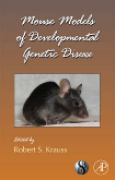
Like humans, mice naturally develop diseases that affect their immune, endocrine, nervous, cardiovascular, skeletal, and other physiological systems. As such mouse has become the premier mammalian model system for studying such diseases as cancer, atherosclerosis, hypertension, diabetes, osteoporosis, and glaucoma; moreover, certain diseases that occur in humans but not normally in mouseCF, ALS, Huntingdons disease, for examplecan be induced by manipulating the mouse genome and environment. This volume reviews current research findings andthought on mouse models for such human diseases as diabetes, cancer, Alzheimers, coronary disease, and hypertension, to name a few.* Provides busy clinicaland basic science researchers a one-stop overview and synthesis of the latestresearch findings and contemporary thought in the area.* Allows researchers to compare and contrast disease models and also to learn about what models havebeen developed for large-scale distribution. * Allows researchers to evaluatebasic differences in mouse and human biology and propose alternate pathways and possible gene interactions of the disease.
- ISBN: 978-0-12-374454-8
- Editorial: Academic Press
- Encuadernacion: Cartoné
- Páginas: 350
- Fecha Publicación: 15/12/2008
- Nº Volúmenes: 1
- Idioma: Inglés
